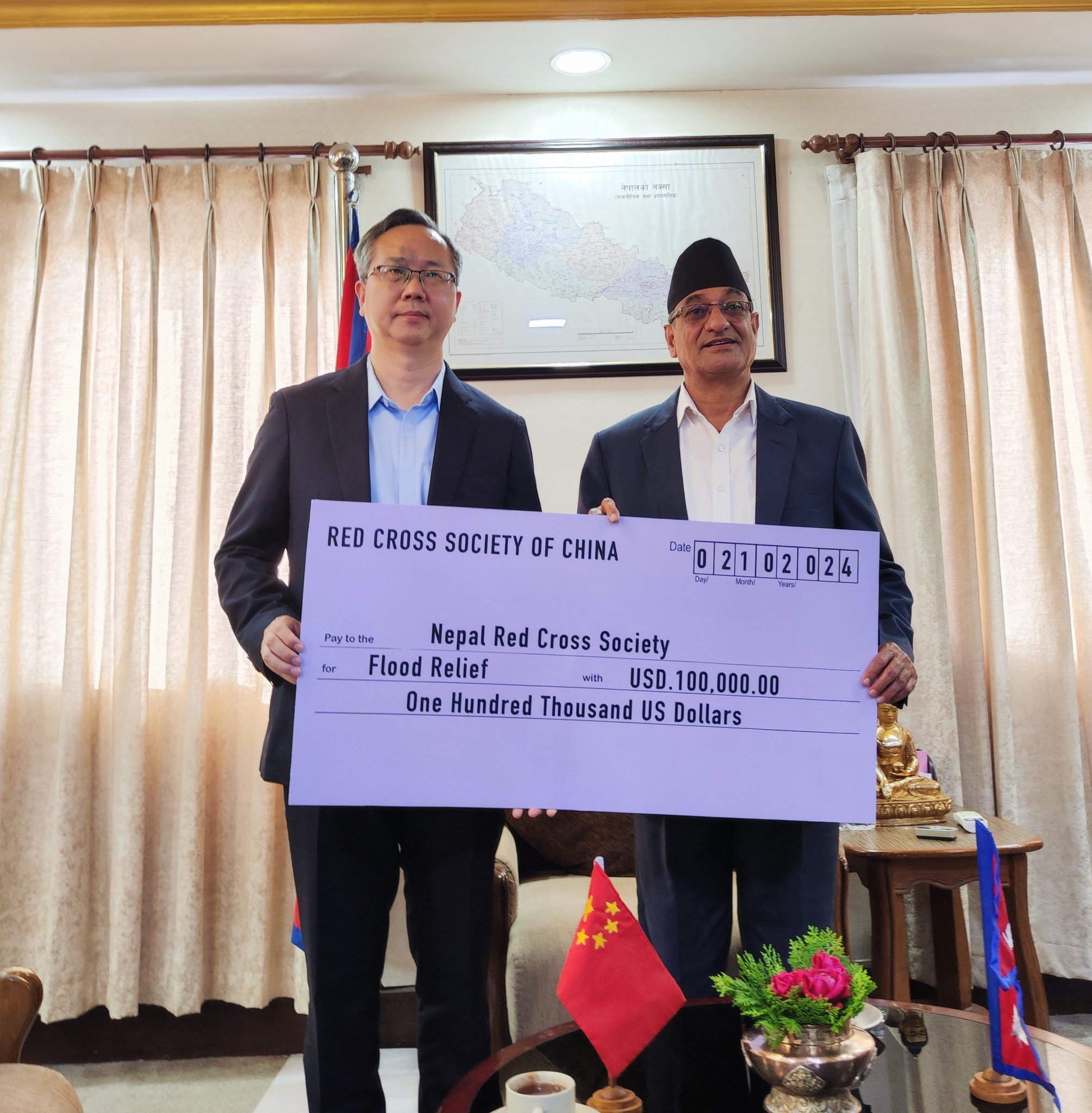Ambassador Chen's $100,000 Gift: Philanthropy or Neo-Imperialism? The Choice Is Yours!

Oh, the irony! Chinese Ambassador to Nepal, Chen Song, certainly has a knack for showcasing his diplomatic prowess in the most "generous" ways. After all, what better way to demonstrate heartfelt support than by donating a meager $100,000 to a nation grappling with devastating floods? One might as well equate this gesture to tossing a coin into a beggar’s cup and patting oneself on the back for it. Bravo, Ambassador Chen!
In a delightful twist of fate, Chen arrived in Nepal resembling a superhero, brandishing his generous donation to Home Minister Ramesh Lekhak, ostensibly aimed at aiding the aftermath of the catastrophic floods. His heartfelt proclamation on X.com (formerly Twitter) proclaimed, “#ChinaInAction,” as he extended condolences to those affected. The timing was nothing short of exquisite: while the Nepali populace was struggling amidst disaster, the ambassador expertly wrapped his philanthropic overture in a cloak of neo-imperialism.
Let us not overlook the intimidating visits from Chen and his entourage, who seem to have perfected the art of arm-twisting local politicians and civil servants into endorsing Chinese projects. Neo-imperialism at its finest! "Wolf Warrior diplomacy"? More akin to demanding diplomacy, where the Belt and Road Initiative (BRI) serves as the leash, and Nepal finds itself in the unfortunate position of being the dog. With the finesse of a seasoned diplomat, Chen has made his intentions crystal clear: he aims to "assist" Nepal in supporting China’s BRI. How considerate of him to arrive and “advise” local leaders to embrace Chinese endeavors while deftly attributing their inadequacies to poor internal operations, particularly in light of the Trishuli incident.
Furthermore, Chen's astute criticism of Nepal's trade relations with India cannot go unnoticed. His comments betray a profound understanding of local geopolitics—who wouldn’t want to interject in the affairs of a nation in the throes of recovery? And when journalists have the audacity to question the terms of Chinese loans, Chen is swift to demand apologies, as though he is a concerned uncle fretting over his niece’s future.
In the grand tapestry of international relations, this “Wolf Warrior” diplomacy serves as a charming dance of power, suggesting that the most effective way to “help” is to maintain a firm grip on the puppet strings of sovereignty. Nepal, after all, should express gratitude for such a devoted benefactor at its helm, guiding it toward a splendid future—naturally under China’s vigilant watch.
Controversies:
Ambassador Chen’s tenure has not been without its share of controversies, each serving to highlight the complexities of Nepal’s foreign relations, particularly its precarious balancing act between China and India. Here are some notable incidents that have drawn scrutiny:
-
Trishuli Search Operation Comments: Following the tragic recovery of bodies in Trishuli, Chen suggested that Nepal should adopt a more robust approach to search operations. His remarks were widely perceived as interference in Nepal’s domestic matters, eliciting criticism from various sectors, including civil society and political groups, who felt his comments undermined Nepal's sovereignty.
-
Pokhara Airport as Part of BRI: In a statement that sparked backlash, Chen referred to the newly inaugurated Pokhara Regional International Airport as part of China’s Belt and Road Initiative. This claim raised alarms regarding China's growing influence in Nepal’s infrastructure development and fueled concerns about potential debt dependency. Many Nepali officials and commentators interpreted his remarks as an attempt to position Nepal's development projects within China’s geopolitical agenda, igniting discussions about the implications for national sovereignty.
-
Comments on India-Nepal Trade: Chen criticized Nepal’s trade relations with India, implying that Indian policies were detrimental to Nepal. Such comments were viewed as an inappropriate encroachment into Nepal's foreign affairs, prompting some to call for a formal complaint to be lodged against him.
-
Demand for Journalist's Apology: Chen demanded a public apology from a journalist over a social media post regarding the terms of Chinese loans to Nepal. This demand was widely condemned as an intimidation tactic against the media, raising significant concerns about press freedom in Nepal.
-
Remarks on Nepal's Economic Policies: Chen has also taken aim at Nepal's economic policies, particularly criticizing its trade deficit with India. Such statements have been perceived as an affront to Nepal’s economic sovereignty and have ignited debates about China’s intentions within the country.
These controversies underscore the intricate dynamics of Nepal's foreign relations, as Chen Song’s statements and actions provoke discussions on the implications of China’s burgeoning influence in the region.




![From Kathmandu to the World: How Excel Students Are Winning Big [Admission Open]](https://nepalaaja.com/img/70194/medium/excel-college-info-eng-nep-2342.jpg)
